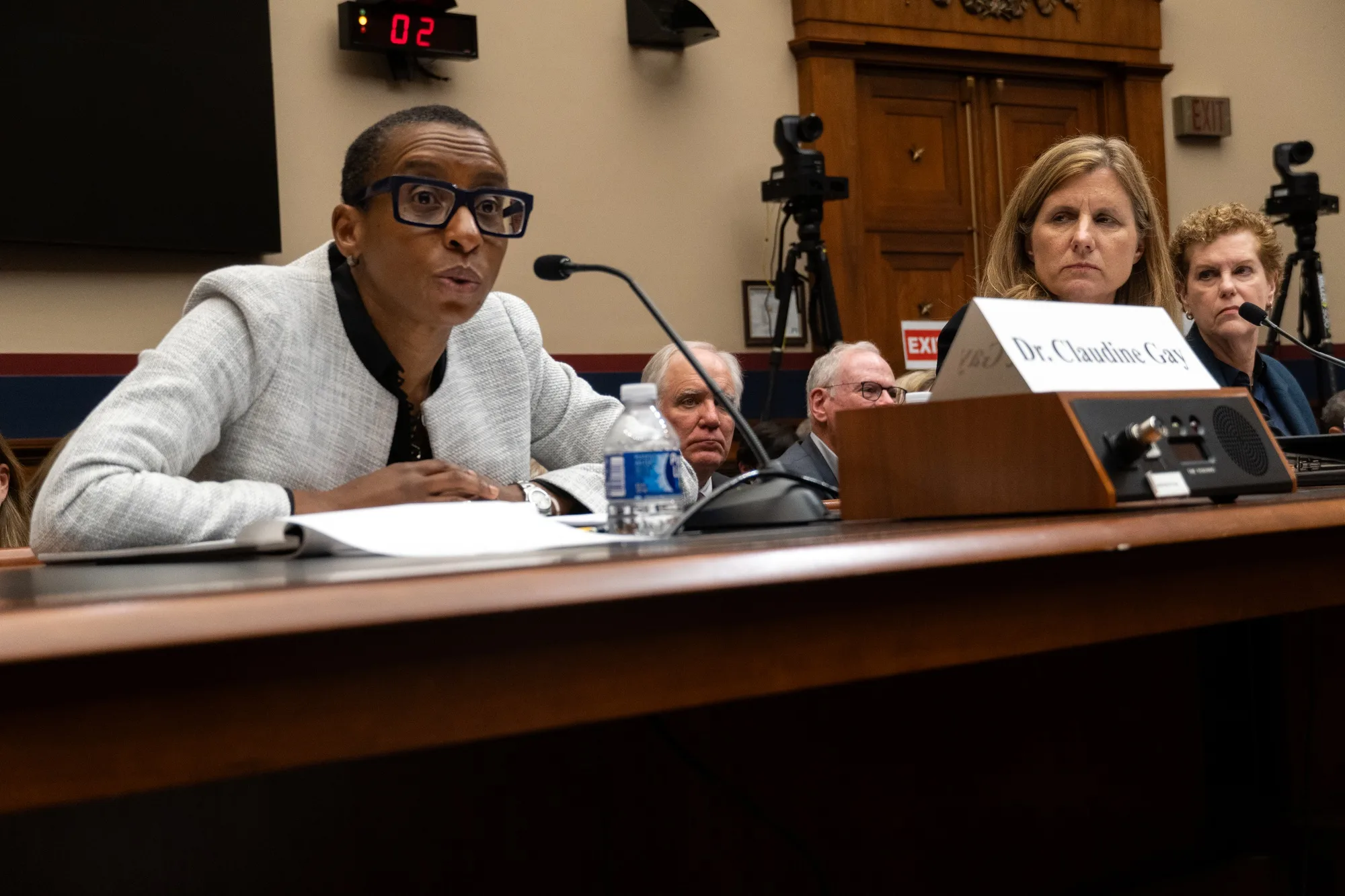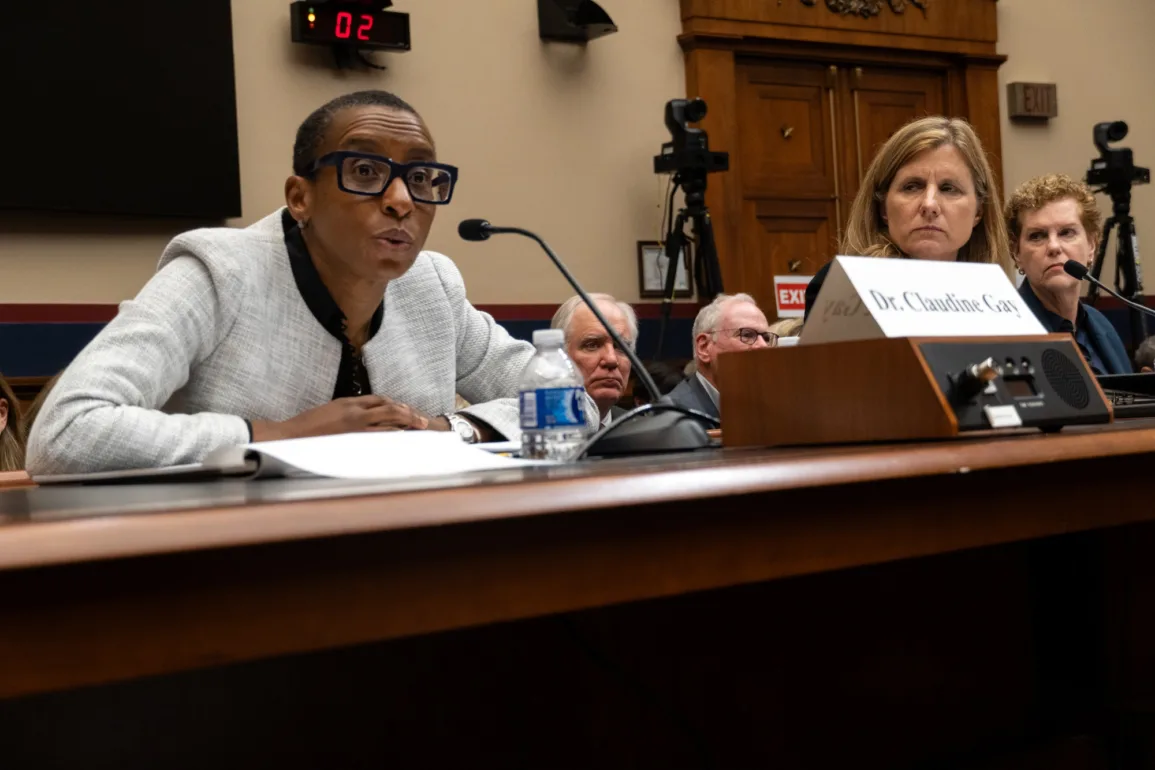
Harvard President Claudine Gay submitted corrections to two articles published in 2001 and 2017, after the Harvard Corporation acknowledged allegations of plagiarism against her earlier this week, University spokesperson Jonathan L. Swain wrote in an emailed statement on Friday.
The corrections involve adding “quotation marks and citations” referencing three articles from which Gay was accused of plagiarizing, Swain wrote.
The announcement that Gay submitted corrections to two scholarly articles concludes an extraordinary week for Harvard’s beleaguered president. The Harvard Corporation weighed asking Gay to resign during her first semester at the helm of the University, before opting to publicly back Gay on Tuesday.
The Corporation — Harvard’s highest governing body — wrote that its members “became aware in late October of allegations regarding three articles,” in their Tuesday statement.
The board wrote that it “initiated an independent review” of Gay’s published scholarship at her own request, which “revealed a few instances of inadequate citation.”
“While the analysis found no violation of Harvard’s standards for research misconduct, President Gay is proactively requesting four corrections in two articles to insert citations and quotation marks that were omitted from the original publications,” the Corporation’s statement said.
Conservative activist Christopher F. Rufo and journalist Christopher Brunet first accused Gay of plagiarism in a Substack post, followed by subsequent reporting by the Washington Free Beacon and the New York Post and a later post circulated on X by Rufo.
The corrections address a 2017 article titled “A Room for One’s Own? The Partisan Allocation of Affordable Housing” in the Urban Affairs Review and a 2001 article titled “The Effect of Black Congressional Representation on Political Participation” in the American Political Science Review — both of which contain passages that were referenced in the allegations earlier this week.
Swain did not comment on the other allegations of plagiarism or whether Gay would request corrections to her 1997 dissertation or other published work accused of containing plagiarized material.
Advertisement
In his statement, Swain wrote that Gay submitted updates to the 2017 article that added references to a 2011 paper by University of California, Irvine professors Matthew Freedman and Emily G. Owens, and a 2011 paper by Miami University professor Anne R. Williamson.
The Free Beacon reported on Monday that Gay’s article in the Urban Affairs Review contained a description of a technical metric used in her study that was almost identical to the paper by Freedman and Owens, save for the inclusion of the word “financial.”
In a footnote in her article, Gay thanked Freedman and Owens for sharing a dataset with her, but did not attribute a shared phrase to their 2011 paper.
The Post reported Tuesday that the Gay’s paper also contains a description of the Low Income Housing Tax Credit which is similarly worded to a description by Williamson, who is not cited in the paper.
In a previous statement to The Crimson, Owens wrote that she believed Gay had not plagiarized their work. Neither she nor Freedman immediately responded to a request for comment on Friday.
Williamson wrote in an email Friday that she felt “this correction is the appropriate course of action on President Gay’s part” and that she was “completely satisfied.”
Urban Affairs Review Associate Managing Editor Emily Holloway confirmed in an email that the journal had “received the corrections” mentioned in Swain’s statement.
The Free Beacon also reported that the same article by Gay had “borrowed language” from a book by The New School professor Alex F. Schwartz. Swain did not mention any update requests regarding Schwartz’s book, which was cited but not directly quoted from.
Advertisement
Schwartz previously told The Crimson that he did not consider Gay’s use of his work plagiarism.
Swain wrote that Gay is also correcting her 2001 article in the American Political Science Review to add quotation marks and a citation to material from a 1990 study by Lawrence D. Bobo and Franklin D. Gilliam Jr.
Bobo is currently Harvard’s dean of Social Science and Gilliam now serves as chancellor of the University of North Carolina at Greensboro.
A passage in Gay’s 2001 article described Bobo and Gilliam’s study using nearly identical wording to theirs. The passage was preceded by a citation but did not directly quote any of the similar language.
Editors of the American Political Science Review confirmed Friday that Gay had reached out to correct the 2001 paper and wrote that the journal “will publish an appropriate corrigendum.”
Gay uses similar wording to describe Bobo and Gilliam’s study in her 1997 dissertation.
In a previous statement, Bobo wrote that Gay’s dissertation and the 2001 article included “appropriate references,” while Gilliam said he did not consider Gay’s dissertation to have plagiarized their paper. Neither immediately responded to a request for comment for this article.
Advertisement
A Harvard website titled “What Constitutes Plagiarism?” requires that text copied word-for-word from another source be placed in quotation marks and clearly cited, or else paraphrased. “If your own language is too close to the original, then you are plagiarizing, even if you do provide a citation,” the website states. It is unclear when the guidelines described on the website came into effect.
—Staff writer Tilly R. Robinson can be reached at tilly.robinson@thecrimson.com.
—Staff writer Neil H. Shah can be reached at neil.shah@thecrimson.com. Follow him on X @neilhshah15 or on Threads @kne.els.



